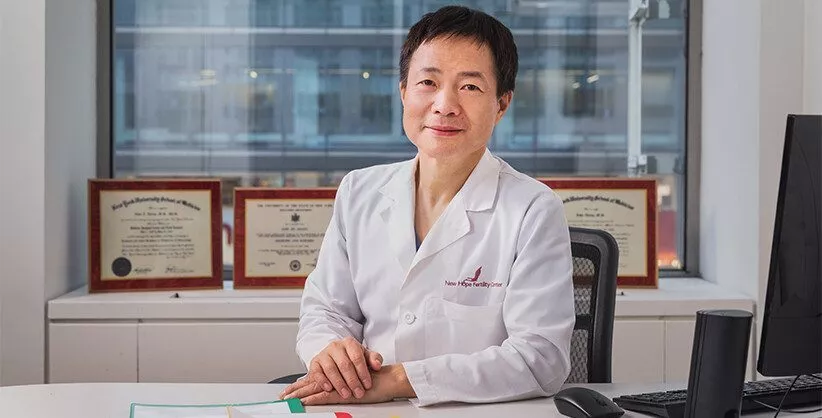Doctor Zhang is the Founder of New Hope Fertility Center in New York City where he has served as the Medical Director since opening in 2004 and oversaw the expanding fertility network internationally to China, Russia, and Mexico.
A true pioneer in the area of minimally invasive (Natural Cycle and Mini-IVF™) fertility care, Dr. John Zhang is an active researcher and medical technology developer. He has been behind several notable achievements in the area of assisted reproductive technology (ART), including the birth of a child by a 49 year-old using her own eggs, helping to restore a young woman’s fertility through a recent ovarian tissue transplant surgery in February of 2012, and being named one of New York’s Top Doctors.
Dr. Zhang completed his medical degree at the Zhejiang University School of Medicine, and subsequently received his Master’s Degree at Birmingham University in the UK. In 1991, Dr. Zhang earned his Ph.D. in In-Vitro Fertilization (IVF), and, after studying and researching the biology of mammalian reproduction and human embryology for nearly ten years, became the first Fellow in the Division of Reproductive Endocrinology and Infertility of New York University’s School of Medicine in 2001.
When it comes to conceiving a baby, Dr. Zhang’s experience successfully resolving fertility issues has made him a leading fertility doctor, both within the United States and internationally. As a renowned innovator in the modern approach to reproductive medicine, he has established some of today’s most groundbreaking infertility solutions, providing help to countless women and couples. Mini-IVF™ allows women who struggle to conceive, an opportunity to reproduce without the invasiveness and physical stress that often accompanies other forms of treatment for fertility. Dr. Zhang commits his visionary approach to the continued progress in the field of reproductive medicine through ongoing research aimed at advancing the field. His ultimate goal is to develop fertility help in ways that are much easier and much less invasive than ever before. From preparing for IVF all the way through successful treatment completion, Dr. Zhang actively oversees his patients’ process and is proud of the achievements heralded by New Hope Fertility Center.
Today, Dr. Zhang continues his research in non-embryonic stem cell research, long-term cryopreservation of oocytes, and oocyte (human egg cell) reconstruction by nuclear transfer. He is currently one of a handful of Reproductive endocrinologists in the United States to hold a Ph.D. in embryology while also being certified as a High Complexity Lab Director.
Keep up with the latest from Dr. Zhang on his blog where he talks about trending topics in the field of Assisted Reproductive Technologies and IVF.
Dr. Zhang speaks English and Chinese.
Message from Dr. John Zhang
Awards & Special Recognition
Publications
Awards & Special Recognition
Publications
Zhang, J.J., Boyle, M. and Allen, W.R. (1989)
Recent studies on in vitro maturation and fertilization of equine oocytes. Equine Vet. J., Supple. 8, 101-104
Adghe, A. J-H., Zhang,J.J., Cuthber, J. and Obhria, M. (1989)
Effects on human sperm motility of antisperm antibody: a study using timed exposure photomicrography. Inter. J. Andro. 12, 281-285.
Zhang, J., Boyle, M.S., Smith, C.A., and Moore, H.D. (1990)
Acrosome reaction of stallion spermatozoa evaluated with monoclonal antibody and zona-free hamster eggs. Mol Reprod Dev, 27, 152-158.
Zhang, J.J., Ricketts, W.S. and Tanner, SJ. (1990)
Antisperm antibodies in the semen of a stallion following testicular trauma. Equine Vet. J.
22,138-141.
Zhang, J.J., Muzs, L.Z., and Boyle, M.S. (1990)
In vitro fertilization on or horse follicular oocytes matured in vitro. Mol Reprod Dev, 26 361-385.
Zhang, J.J., Muzs, L.Z, and Boyle, M.S. (1991)
Variations in structural and functional changes of stallion spermatozoa in response to calcium ionophore A23187. J. Reprod. Fert, 44,199-205.
Zhang, J.J., Liu, J., Tchabo, J.G., Yang, X., and DiMattina, M. (1994)
Zona-opening of hamster oocytes: a comparative study using macro- and micro-manipulation methods. Hum Reprod 9, 137-140.
Zhang, J., Liu, J., Xu, K.P., Liu, B., and Dimattina, M. (1995)

